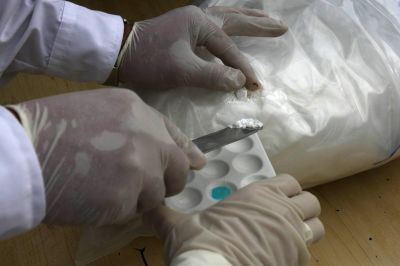Latin American drugs threaten Africa stability: experts

Your support helps us to tell the story
From reproductive rights to climate change to Big Tech, The Independent is on the ground when the story is developing. Whether it's investigating the financials of Elon Musk's pro-Trump PAC or producing our latest documentary, 'The A Word', which shines a light on the American women fighting for reproductive rights, we know how important it is to parse out the facts from the messaging.
At such a critical moment in US history, we need reporters on the ground. Your donation allows us to keep sending journalists to speak to both sides of the story.
The Independent is trusted by Americans across the entire political spectrum. And unlike many other quality news outlets, we choose not to lock Americans out of our reporting and analysis with paywalls. We believe quality journalism should be available to everyone, paid for by those who can afford it.
Your support makes all the difference.The illegal drug trade from Latin America to Europe has the potential of destabilizing regions of Africa more than Islamist extremists, a regional expert told a US Senate panel Tuesday.
Over the past five years Latin American drug cartels have increasingly been shipping cocaine to Europe via west Africa, David Gutelis told the Senate Foreign Relations Subcommittee on African Affairs.
The cocaine is smuggled across the Sahara desert to ports in Morocco, Libya and Egypt and eventually into Europe, said Gutelis, a former university professor who co-owns the Ishitrak consulting firm and has lived in the region.
"Demand from Europe and the relative efficiency of South American cartels in moving drugs to and through West Africa ports has led to an exponential growth in the value and volume of the trade," said Gutelis.
The drug trade "is the largest current threat to regional stability," even more dangerous than radicals with the Al-Qaeda in the Land of the Islamic Maghreb (AQIM), Gutelis said, adding that US officials "tend to give the group more credit than it deserves."
His testimony came one day after a UN Office on Drugs and Crime official said that a Boeing transport plane that crashed November 5 in Gao, in northeastern Mali, was being used to transport cocaine from Venezuela to West Africa. Venezuela said it would investigate.
West Africa "has emerged as a major trans-shipment area for cocaine flowing from South America to Europe," said John Carson, the assistant secretary of state for African affairs, testifying at the same hearing.
"Narco-trafficking poses a direct threat to US interests since the proceeds of cocaine trafficked through the region generally flow back to Latin American organizations moving drugs to the United States," he said.
Smuggling routes have existed for centuries across the Sahara, but until recently cigarettes, fuel and people were the top items being moved, Gutelis said.
The profits from those items, however, "simply cannot compare to cocaine. This is relatively new," he said.
ch/jm
Join our commenting forum
Join thought-provoking conversations, follow other Independent readers and see their replies
Comments